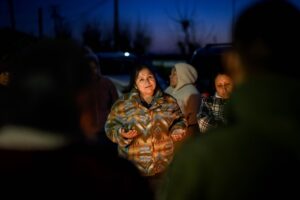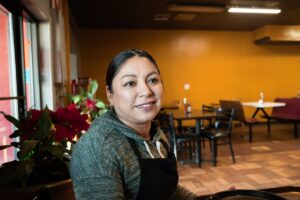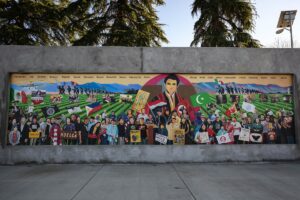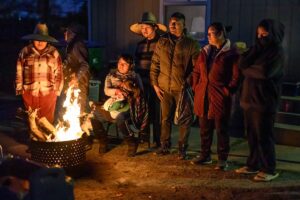by Peter Schurmann, EMS
posted Jan. 18
POPLAR, Ca. -– In the early 1970s, this unincorporated town in California’s agricultural heartland was designated by county officials as having “no authentic future.” That designation—entailing dramatic cuts to basic services remained until as recently as 2023.

Now, following a series of raids on immigrants that began on Jan. 7 in neighboring Kern County, residents here say the future does indeed look bleak.
“People are scared. They don’t want to come out. We’re all scared,” says Gregorio, a resident of Poplar for the past seven years and the owner of a local business that caters to the community’s farmworker population. (We are not using Gregorio’s last name to protect his identity.)
“If you’re undocumented, it’s not safe to walk the streets,” he added. “And this is just the start. It’s going to get worse over the next four years.”
With Donald Trump’s inauguration as president just days away, the raids -— dubbed “Return to Sender” by Customs and Border Patrol (CBP) -— are viewed here as a dress rehearsal for his promised mass deportation campaign of unauthorized immigrants.
CBP Agent Gregory Bovino, who led the raids, stated in a social media post that CBP officers maintained the right to make arrests of anyone suspected of being in the country illegally without regard to due process. He promised “more to come.”
CBP reports that some 78 arrests were made over the course of the three-day operation and included individuals with outstanding warrants for crimes ranging from sexual assault of minors to illegal drug and firearm possession, as well as DUIs and other lesser offenses.
CBP says the raids were confined to Kern County. But several Poplar residents say they witnessed CBP agents patrolling local gathering spaces in and around the town. Several individuals who asked not to be identified described agents apprehending one individual on private land.
Requests for comment from CBP to confirm the statements went unanswered by the time of publication. A spokesperson for the Tulare County Sheriff’s office said they were unaware of any operations or detentions within the county.
CBP spokesperson David Kim initially told news media that Operation Return to Sender was targeted to specific individuals and that it was not a widespread roundup. He acknowledged, however, that individuals not previously identified for apprehension due to past criminal convictions were also detained.
“We don’t know what’s going on with the raids,” noted Gregorio, adding the swirl of misinformation online is exacerbating the panic residents are experiencing. “People are posting all kinds of lies on social media. Everyone’s confused over what is true and what isn’t.”
The fear now gripping the community in Poplar and across the region is also taking a toll on the local economy. Silvia (we are withholding her last name to protect her identity) says sales at her bakery have fallen 70% since the raids last week, as residents and families fear leaving their homes for even the most basic of necessities.
“It is stressful,” she noted. “If I don’t see someone for a day, let’s say a regular, I worry about what might have happened to them. Did they get detained, deported … ”
Down the street at Sabroso Poplar, a local Mexican eatery, waitress Angelica Rana points to the empty dining hall. “Usually, this place would be full. Today, there’s no one here,” she says, adding that in her 18 years living in Poplar she’s never seen anything like this.
“We depend on the people who work in the fields. So yes, there’s been a big impact,” she said.

Poplar, with just under 2,000 residents, is located on the southeastern edge of Tulare County, one of the nation’s largest producers of dairy, citrus and berries, among other crops, a multi-billion-dollar industry built largely on the backs of migrant labor.
Two-thirds of Poplar’s residents are Latino, though there is also a long-established Filipino community, as well as a smaller Yemeni population and indigenous migrants from parts of Mexico and Central America.
An estimated 310,000 people live in unincorporated communities like Poplar across the San Joaquin Valley.
In the 1950s and 1960s, the town was the site of some of the earliest stirrings of what would become the farmworker movement led by labor groups like the United Farm Workers Union (UFW), among others. That history is celebrated in a new mural in the local park, which depicts the many faces -— past and present —- of those who have fought to improve conditions locally.

“This was an epicenter of the farmworker movement and one of the areas that experienced the most violence,” explains Mari Pérez Ruíz, co-founder of the non-profit Central Valley Empowerment Alliance (CVEA), which advocates on behalf of residents in Poplar and surrounding communities.
CVEA is housed in what used to be Poplar’s fire house, shut down years earlier as part of cuts to local services after county officials identified it as among 13 communities with no growth prospects. All 13 were majority communities of color. Cuts included essentials like water and sewage. CVEA fought successfully to restore services for Poplar during California’s record drought ending in 2016.
“They did not make it easy,” noted Pérez Ruíz, referring to county officials and the outsized interests of local growers.
Today, she and her team are busy supporting families too fearful to go to work or send kids to school. CVEA has produced small, pocket-sized “Know Your Rights” pamphlets that detail steps to take in case someone is stopped by immigration officials, as well as contact numbers for legal aid.
On a recent evening, CVEA volunteers handed out food and clothing to a small community of indigenous farmworkers on the outskirts of Poplar. Many spoke of lost wages during the previous week. “Why are they targeting us,” one man complained. “We’re doing honest work here, trying to feed our families.”

Gregorio says half of what people earn here typically goes to cover rising rents, with the other half going toward food, childcare and other expenses. “It’s impossible,” he says.
As for the mood among neighbors and customers, “It is the same conversation with everyone you meet,” he said. “How are you?” “Scared.”
Manuel Ortiz, Ed Kissam and Nicolás Díaz Magaloni contributed reporting for this story by Ethnic Media Services, posted on Jan. 17 here.
Editor’s note: There have been no verified reports of CBP in the Chico area in recent days, according to NorCal Resist Chico. Follow the organization’s Facebook page here for information on an upcoming Know Your Rights training.

President Trump has been clear in his promise to deport those who commit crimes, and he has always stood firm on upholding the rule of law. If you are an illegal immigrant, the message is simple: don’t commit a crime.
However, as of this writing, President Trump is not yet in the White House, and the credit for recent arrests cannot rightfully be attributed to him. But rest assured, when 47th President Donald Trump takes office, the enforcement of these policies will be stronger than ever.
You are not Christian.
You are a racist!
If you live in America and are white… YOU ARE LIVING ON STOLEN PROPERTY!
TRUMP IS. A FELON, RAPIST, SCUMBAG !
STOP THE WORSHIPING OF A FELON!
He also promised lower grocery prices and a better economy. What do you think is going to happen when he deports all undocumented individuals? Who is going to pick the fruit and vegetables? What is is going to happen to all the farming businesses? What is going to happen to all the local businesses? One more thing. Have you ever thought about all the undocumented workers that use a fake SSN and contribute to social security/state/federal taxes? Who do you think keeps all that money? The government. This is going to hurt the economy. So enjoy the prices of vegetables and fruits now. Because it is going to get expensive. And I feel sorry for the local businesses that will will go bankrupt from this.
Why do they always pick on the Mexicans? Trump always picks on Mexicans. There are illegals here from Other countries as well. When James Polk started the war against Mexico,it was to steal the land. Abraham Lincoln, then a general didn’t agree with Polk and his terrorist acts,of starting a war with a country that had just gained it’s independence from Spain. It was his plan,to steal the land. Or (annex)as Polk claimed. There is Division in this country. And too much Racism.
Sheinbaum. Deport all Illegals in los Estados Unidos Mexicanos back to the north. “Gavachos”
Totally agree, deport all gringos from Mexico if they are in Mexico illegally!! Those illegally in the U.S. the party is over, beware, thank God, The ADULTS are back in charge.
What is interesting is how many Mexican supported/support Trump. I don’t know why.
Wow, is there not anything more important in this Country that needs addressing over immigrants that are working in our fields to provide food for all of us!
If you pay any kind of attention to what Trump says he says he’s going to deport all illegals. He doesn’t say anything about Mexicans. Quit whining.
There is nothing in history indicating Lincoln was ever in the military, nor even a general. Where did you get your “facts”?
“God bless America” That’s what the currency says??? Discrimination, racism, and division. Keep picking on the Mexicans. And look around. Too many homeless in this country, that can work. And Look who came to Los Angeles to help with the Fires.
Look, bottom line is GO THROUGH THE PROCESS TO BECOME A CITIZEN LEGALLY TO AVOID HIDING OR BEING DEPORTED. That goes for ANY Person FROM ANY OTHER COUNTRY, NOT JUST MEXICANS. So don’t whine about it…DO SOMETHING ABOUT IT. Even if it is a lengthy process, in the end IT IS WORTH BEING LEGIT. All my family are American born Hispanics except for my grandma and an aunt and uncle WHO DID DO THE PAPERWORK AND THE WHOLE PROCESS TO GET CITIZENSHIP.
It’s ashame that these people are going to be put through. As a child I worked along with them. My parents both born here were farm laborers. These people are good people. Hard working. They want to better their children. And that did happen as I saw them grow up. Jobs as politicians, health services, etc. They
have drive. Family members will suffer. You talk about the criminals… they have family.
It’s not just Mexicans it’s anyone who’s here unlawfully there just happens to be a lot of Mexicans in California
Who will take responsibility for the cola up trend when the undocumented people of Latin desent are forced to leave everything in the blink of an eye. I’ll be praying for peace and safety for you all in the of my lord and savior Jesus Christ Amen
https://www.facebook.com/stories/1740670552687051/UzpfSVNDOjk5MTc0ODY4OTQ2NDU0MA==/?bucket_count=9&source=story_tray
Going to another country illegally is foolish and hard on many persons. Best to become legal before crossing the border. Then there will be a lot less problems to deal with.